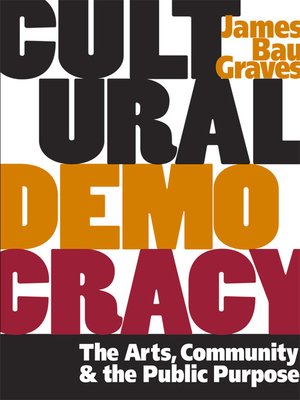
Sign up to save your library
With an OverDrive account, you can save your favorite libraries for at-a-glance information about availability. Find out more about OverDrive accounts.
Find this title in Libby, the library reading app by OverDrive.



Search for a digital library with this title
Title found at these libraries:
| Library Name | Distance |
|---|---|
| Loading... |
Cultural Democracy explores the crisis of our national cultural vitality, as access to the arts becomes increasingly mediated by a handful of corporations and the narrow tastes of wealthy elites. Graves offers the concept of cultural democracy as corrective—an idea with important historic and contemporary validation, and an alternative pathway toward ethical cultural development that is part of a global shift in values.
Drawing upon a range of scholarship and illustrative anecdotes from his own experiences with cultural programs in ethnically diverse communities, Graves explains in convincing detail the dynamics of how traditional and grassroots cultures may survive and thrive—or not—and what we can do to provide them opportunities equal to those of mainstream, Eurocentric culture.
| Contents Appreciation Introduction 1. Communion 2. Tradition and Innovation 3. Presentation and Participation 4. Conservation and Commercialization 5. Donation and Deduction 6. Education 7. Mediation 8. Globalization and Localization 9. Revolution Notes Works Cited Index
Library of Congress Subject Headings for this publication: United States Social life and customs 1971-Arts and society United States, Arts, American|James Bau Graves is co-director of the Center for Cultural Exchange in Portland, Maine. An ethnomusicologist by training, he has developed open-ended partnerships with many of local ethnic communities, and has been active in presenting traditional and contemporary performers to their own and larger audiences.
Drawing upon a range of scholarship and illustrative anecdotes from his own experiences with cultural programs in ethnically diverse communities, Graves explains in convincing detail the dynamics of how traditional and grassroots cultures may survive and thrive—or not—and what we can do to provide them opportunities equal to those of mainstream, Eurocentric culture.
| Contents Appreciation Introduction 1. Communion 2. Tradition and Innovation 3. Presentation and Participation 4. Conservation and Commercialization 5. Donation and Deduction 6. Education 7. Mediation 8. Globalization and Localization 9. Revolution Notes Works Cited Index
Library of Congress Subject Headings for this publication: United States Social life and customs 1971-Arts and society United States, Arts, American|James Bau Graves is co-director of the Center for Cultural Exchange in Portland, Maine. An ethnomusicologist by training, he has developed open-ended partnerships with many of local ethnic communities, and has been active in presenting traditional and contemporary performers to their own and larger audiences.







